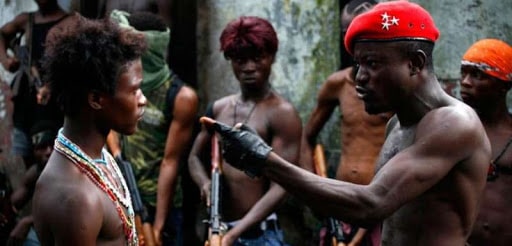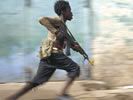Eye For Film >> Movies >> Johnny Mad Dog (2008) Film Review
Johnny Mad Dog
Reviewed by: Jeff Robson

Of all the obscenities that war creates, the phenomenon of the ‘child soldier’ must be one of the worst.
It’s a tactic as old as warfare itself – to take a boy or girl from their family and teach them to kill before they have any sense of right and wrong, or even of their own mortality – but the recent spate of civil wars and rebellions in sub-Saharan Africa have seen it spread and used as a deliberate tool to spread terror and intimidation.

It’s inspired some fine photojournalism and documentary work, and occasionally been seen in mainstream movies such as Blood Diamond, but always as another terror of the Dark Continent for our (usually Western) heroes to deal with. Here the children themselves take centre stage; the result is one of the most gripping, harrowing and moving films I’ve seen for years.
It starts as it means to go on – with a brutally intense series of staccato, hand-held scenes where the only dialogue is a succession of screamed, barely coherent threats and questions. This is the child soldiers at work – descending on a village to loot and terrorise under the pretence of finding information, smoking out Government sympathisers or members of the scapegoated Dogo tribe, and mustering new recruits. Any answer which fails to satisfy (or just vaguely annoys) results in instant execution, culminating in a scene where the one boy who hasn’t managed to hide from them is initiated by being forced to shoot his father or be killed himself.
Be in no doubt, this is a tough watch. The violence is graphic, random and real, and the film operates on a level of constant intensity which mirrors the boys’ permanently hyped-up fighting madness. They speak in a rapid-fire, expletive-laden patois of English, French and tribal dialect; even with subtitles it’s hard to know what they’re talking about sometimes, because, of course, they don’t know themselves. The audience feels as terrified and threatened as the innocent civilians unlucky enough to cross their path - suddenly confronted by a boy with a gun, given liberty to indulge all his capacity for bullying and cruelty with no one to stop him.
However, to simply make the film a parade of harrowing scenes would eventually dull the audience’s sensibilities; instead Sauvaire’s simple but effective screenplay (based on the acclaimed novel by Emmanuel Dongala) puts the boys’ situation in context, and shows that, hard though it may be, there are alternatives to a life conditioned by brutality.
The story focuses on two people – Johnny Mad Dog, (Christophe Minie) commander of the unit seen at the start of the film, a 15-year-old boy who’s already a veteran; and Laokole (Daisy Victoria Vandy) a teenage girl who is trying to take her younger brother and crippled father from their village to the relative safety of the city. Their paths cross on several occasions, but their first meeting sparks an unexplained act of compassion from Johnny.
As the film progresses, it becomes apparent that he is desperate to break from the cycle of violence to which fate has condemned him and his ‘men’. But even when the rebels take the city and find they now have to run a country rather than destroy it, this looks increasingly unlikely. And his hot-headed lieutenant has formed a grudge against him...
The film is a heartfelt cry for someone to stop these children being exploited so cruelly, but offers no easy answers. The rebels deliberately pump the boys full of drugs and rotgut and shout meaningless slogans or grotesque parodies of military ballads at them, encouraging their belief in their own invulnerability by firing blank rounds at them to prove they are immune to bullets. But the way the Government troops are depicted leaves one in little doubt that they would happily do the same. The UN is a stolid but ineffectual presence, preventing the boys from entering a hospital with their wounded comrade unless they put their weapons down, but doing nothing else to halt the chaos beyond their checkpoints.
In the end, the only hope seems to be a recognition of common humanity between the child soldier and his nameless victims. But even that can’t always be taken for granted. As I said, it’s a tough watch - and sometimes it’s important for film to ask questions even if it can’t answer them.
In fact, one of the film’s most remarkable aspects is one that does offer hope of a kind. The performances would be remarkable coming from the most accomplished child actor. But, in fact, the boys are played by former child soldiers (as are some of the adult cast members). That they are now building a new life (the film has set up a charity foundation to help others like them) in Liberia, where the film was shot, proves that the cycle of violence can be broken. It also gives their performances an extra intensity; the fact that they’ve been there reminds the audience that, sadly, nothing in this film is exaggerated.
Don’t be put off by the violence, or feel that this is a ‘worthy’ film that has to be watched out of a sense of duty. It’s a gripping tale, well-told, with characters who, despite being utterly terrifying, you will grow to care about. Nor is it a stereotypical portrait of Africans as innately ‘backward’ or ‘savage’; it tells a universal truth, that any child can be turned into a killer given the wrong circumstances – but underneath the brutality and bravado, there can still be a little boy who just wants to go home. I urge everyone to see this film. But brace yourselves.
Reviewed on: 29 Oct 2008
















